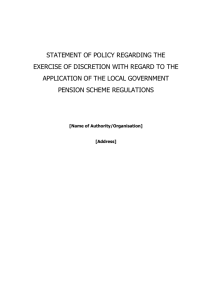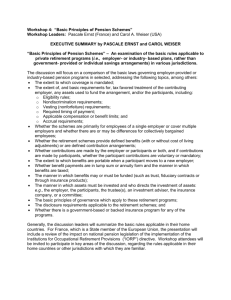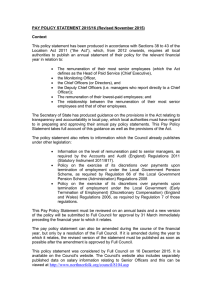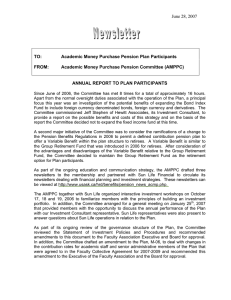1.1 This policy statement has been ... “the Act”), which, from 2012 onwards, requires
advertisement
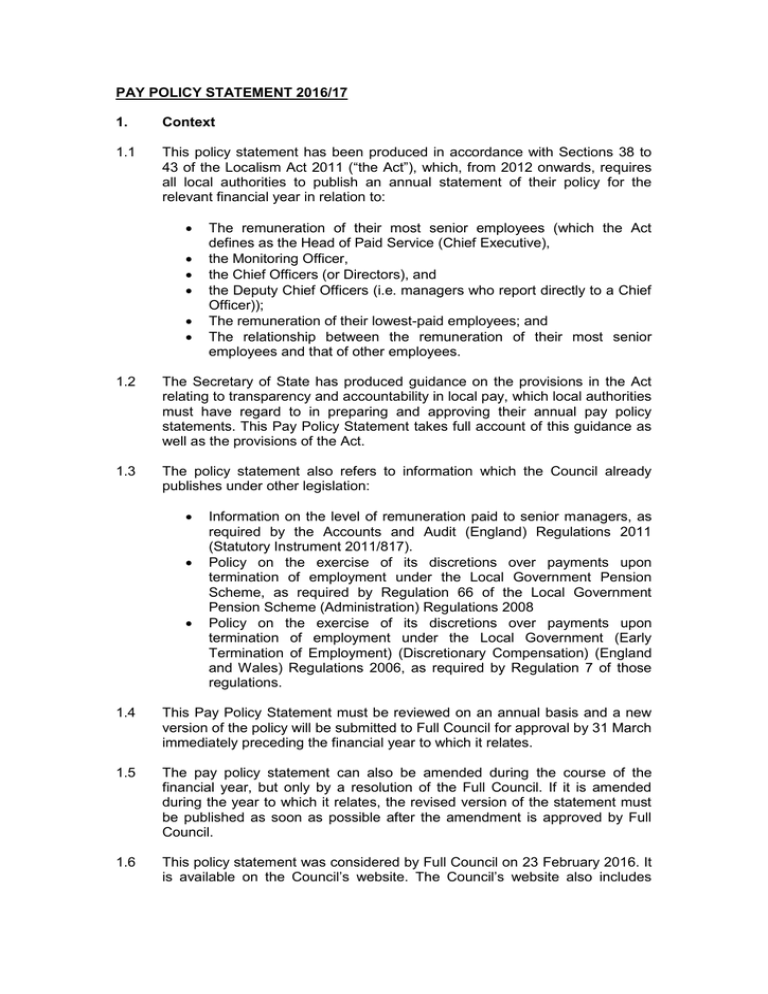
PAY POLICY STATEMENT 2016/17 1. Context 1.1 This policy statement has been produced in accordance with Sections 38 to 43 of the Localism Act 2011 (“the Act”), which, from 2012 onwards, requires all local authorities to publish an annual statement of their policy for the relevant financial year in relation to: The remuneration of their most senior employees (which the Act defines as the Head of Paid Service (Chief Executive), the Monitoring Officer, the Chief Officers (or Directors), and the Deputy Chief Officers (i.e. managers who report directly to a Chief Officer)); The remuneration of their lowest-paid employees; and The relationship between the remuneration of their most senior employees and that of other employees. 1.2 The Secretary of State has produced guidance on the provisions in the Act relating to transparency and accountability in local pay, which local authorities must have regard to in preparing and approving their annual pay policy statements. This Pay Policy Statement takes full account of this guidance as well as the provisions of the Act. 1.3 The policy statement also refers to information which the Council already publishes under other legislation: Information on the level of remuneration paid to senior managers, as required by the Accounts and Audit (England) Regulations 2011 (Statutory Instrument 2011/817). Policy on the exercise of its discretions over payments upon termination of employment under the Local Government Pension Scheme, as required by Regulation 66 of the Local Government Pension Scheme (Administration) Regulations 2008 Policy on the exercise of its discretions over payments upon termination of employment under the Local Government (Early Termination of Employment) (Discretionary Compensation) (England and Wales) Regulations 2006, as required by Regulation 7 of those regulations. 1.4 This Pay Policy Statement must be reviewed on an annual basis and a new version of the policy will be submitted to Full Council for approval by 31 March immediately preceding the financial year to which it relates. 1.5 The pay policy statement can also be amended during the course of the financial year, but only by a resolution of the Full Council. If it is amended during the year to which it relates, the revised version of the statement must be published as soon as possible after the amendment is approved by Full Council. 1.6 This policy statement was considered by Full Council on 23 February 2016. It is available on the Council’s website. The Council’s website also includes separately published data on salary information relating to Senior Officers and this can be viewed at http://www.northnorfolk.org/council/8104.asp 1.7 For the purpose of the pay policy statement the term ‘Chief Officer’ in a local authority context is defined as set out in the Local Government and Housing Act 1989: a) b) c) d) The Head of Paid Service (i.e. the Chief Executive) as designated under section 4 of that Act; The Monitoring Officer designated under section 5(1) of that Act; A statutory Chief Officer and non statutory Chief Officer under section 2 of that Act; A deputy Chief Officer mentioned in section 2 of that Act. 2. Remunerating Chief Officers/Deputy Chief Officers 2.1 The remuneration for Chief Officers/Deputy Chief Officers within the Council can be found at Appendices A, B, C, E and F. 2.2 The Monitoring Officer (MO) service is brought in on a contract basis so the Council does not directly remunerate the MO who is currently an employee of Norfolk County Council. 3. Remunerating the Lowest Paid in the Workforce 3.1 The Council applies terms and conditions of employment that have been negotiated and agreed through appropriate collective bargaining mechanisms (national or local) or as a consequence of Council decisions, these are then incorporated into contracts of employment. The lowest pay point in use by the Council for employees on the council’s pay scale is spinal column point (SCP) 8. This relates to an annual salary of £13,871 (full time equivalent (FTE) and can be expressed as an hourly rate of pay of £7.1897 as at 01 January 2016. Employees on this pay point are defined as our lowest paid employees. This pay point and salary has been determined by the National Joint Council (NJC). See Appendix D for pay scales for staff on grades 5-13. Full Council agreed to pay a Living Wage supplement for SCP’s 8 – 12 for 2016 (excluding apprentices). Continuation of this supplement will be reviewed and determined annually. 3.2 The Council employs a number of apprentices and the salary for these staff complies with the National Minimum Wage. 4. The Relationship between Chief Officer Remuneration and that of other employees 4.1 The highest paid salary point in the Council is that of the Chief Executive at £101,766 as at 1 January 2016. The Chief Executive also currently receives a supplement for carrying out the Interim Chief Executive role for Great Yarmouth Borough Council and this is shown in Appendix A. The median for Chief Officers is £52,806 and for non-Chief Officers is £19,742. This gives a ratio of 1:2.675. The Council does not have a policy on maintaining, reaching or applying a specific pay multiple. However the Council is conscious that remuneration at all levels needs to be adequate to secure and retain highquality employees but not be seen as excessive. 5. Other Aspects of Chief Officer Remuneration 5.1 Other aspects of Chief Officer remuneration are appropriate to be covered by this policy statement, these other aspects are defined as remuneration on recruitment, pay increases, additions to pay, performance related pay, earn back, enhancements of pension entitlements and termination payments. These elements are shown in Appendix A and B. 6. Pay Awards 6.1 Pay awards are determined nationally in accordance with the Joint Negotiating Committee (JNC) for Chief Executives, the Joint Negotiating Committee (JNC) for Chief/Deputy Chief Officers and the National Joint Committee (NJC) for staff paid under the national spinal column points covered by internal grades 5-12. 7. Tax Avoidance 7.1 The Council is committed to tackling all forms of tax avoidance and therefore encourages the direct employment of staff and pays them via the payroll system. In a few circumstances where it is more appropriate to engage people on a self-employed basis, the Council will utilise the procurement policy and follows guidelines to ensure that the correct employment status is identified before being engaged. When a need arises for an ‘interim’ appointment, the Council may consider the use of an agency. 8. Re-engagement of ex North Norfolk District Council staff within the scope of this policy 8.1 All permanent / fixed term posts are advertised in accordance with the council’s recruitment practices and procedures and appointment is made on merit. Interim management appointments are made in accordance with the council’s procurement policy. 9. Review 9.1 The Localism Act 2011 requires relevant authorities to prepare a Pay Policy Statement for each subsequent financial year. The next statement will be submitted to Full Council for approval by 31 March 2017. 9.2 As necessary, the Council may by resolution amend the pay policy statement at times other than that of the prescribed annual statement. Post Salary grade Chief Executive 1 Expenses / car allowances Travel and other expenses are reimbursed through normal Council procedures. Bonuses / PRP / Earn Back The current terms and conditions of employment does not provide for any of the above elements Honoraria / Acting Up Honoraria and acting up payments do not apply Market/Salary Supplements £3808 (Interim shared services supplement) (April to June 2016) Election Fees As above As above A salary/market supplement has not been applied to this post. As above (where applicable) As above £4553 pa (s151 responsibilities) £2190 (Interim shared services supplement) (April to June 2016) £4553 pa (specialist delegated responsibilities) £673 per month (interim shared services supplement where appropriate) As above (where applicable) As above As above (where applicable) As above As above (where applicable) As above Corporate Directors x 2 2 Car allowances are paid in accordance with the rates set out in Council’s Travel Policy (see Appendix D) As above Head of Finance/s151 Officer 4 As above As above Head of Planning Head of Service x 6 4 As above As above Could be applied where appropriate on authorisation of Corporate Leadership Team As above 4 As above As above As above Returning Officer fees for national elections are set by Central Government. Local election fees are paid in accordance with a scale of fees which is based on national election rates and agreed locally. Election fees are paid separately. Severance Arrangements The Council’s normal policies regarding redundancy and early/flexible retirement apply to the postholder Appendix A Appendix B Aspect of Chief Officer Remuneration Recruitment and Retention Council Policy All posts in the Council are evaluated using the Council’s job evaluation scheme. Each grade comprises a range of pay points. Employees will receive an annual increment (and in some cases, 6 months after starting work with the Council), subject to the top of their grade not being exceeded. The post will be advertised and appointed to at the appropriate approved salary for the post in question and individuals will be placed on the appropriate SCP within the pay grade for the post that they are appointed to. The rules regarding appointment to a Chief Officer role are set out in the Constitution (Chapter 10). Where the Council is unable to recruit to a post at its designated grade, it will consider the use of temporary market supplements or ‘Golden Hello’s’. Golden hello’s are re-payable in whole or in part in certain circumstances should the officer leave before an agreed period has been served. In areas of skills shortages (locally or nationally) the Council will consider the use of retention payments. Access to appropriate elements of the Council’s relocation Scheme may also be granted in certain circumstances, when new starters move to the area. All staff are covered by the Council’s appraisal scheme. Pay Increases Additions to Pay Professional Subscriptions Employee Assistance Programme (EAP) Contract for Services Redundancy and payments on termination Pension contribution rates The above applies to all employees. The Council will apply any pay increases that are agreed by the relevant national negotiating bodies. The Council will also apply any pay increases that are as a result of Council decisions to significantly increase the duties and responsibilities of the post in question beyond the normal flexing of duties and responsibilities that are expected in senior posts. This applies to all employees. The Council would not make additional payments beyond those specified in the terms and conditions of employment and this policy statement. This applies to all employees. These are payable where they are required for the post and should be limited to one subscription per Officer. This applies to all employees. Access to the EAP scheme is available to all employees and Elected Members. Where the Council remains unable to appoint chief officers on recruitment, or there is a need to provide interim support to cover for a vacant substantive chief officer post, the Council may, where necessary, consider engaging individuals under ‘contracts for service’. These will be sourced through a relevant procurement process ensuring the Council is able to demonstrate value for money from competition in securing the relevant service. The Council has a single policy which applies to all employees (see Appendix F). Where termination of employment is subject to a settlement agreement that agreement may include a negotiated payment in exchange for which the employee undertakes not to pursue claims against the Council. This is always subject to the completion of a business case and appropriate authorisation as laid out in the above policy. Staff who opt to join the Local Government Pension Scheme (LGPS) pay current contribution rates between 5.5% to 12.5%. The employer contribution rate is currently 14.5% and this is the same rate for all staff. Salary grades for Chief Officers and Deputy Chief Officers (1 January 2015) Appendix C Grade 1 (Chief Executive) Annual SCP Amount 300 301 99,634.00 101,766.00 Grade 2 (Directors) Annual SCP Amount 310 311 312 313 314 67,846.00 69,554.00 74,777.00 76,696.00 78,853.00 Grade 3 (Not utilised) Annual SCP Amount 320 321 322 323 324 55,135.00 56,833.00 58,415.00 64,125.00 65,570.00 Grade 4 (Heads of Service) Annual SCP Salary 330 331 332 333 334 46,081.00 47,332.00 48,565.00 49,808.00 53,862.00 Appendix D Pay scales for grades 12 - 5 (Effective from 25 February 2015) Grade SCP 8* 9* 10* 11* 12* 13 14 15 16 17 18 19 20 21 22 23 24 25 26 27 Grade 12 Grade 11 Grade 10 Grade 9 Salary 13,871 14,075 14,338 15,207 15,523 15,941 16,231 16,572 16,969 17,372 17,714 18,376 19,048 19,742 20,253 20,849 21,530 22,212 22,937 Grade Grade 7 Grade 6 Grade 5 SCP 31 32 33 34 35 36 37 38 39 40 41 42 43 44 45 46 47 48 49 50 Salary 27,123 27,924 29,558 30,178 30,978 31,846 32,778 33,857 34,746 35,662 36,571 37,483 39,267 40,217 41,140 42,053 43,863 These posts are supplemented to the Foundation Living Wage rate for the period 2016. Appendix E TRAVEL POLICY INTRODUCTION The purpose of this policy is to set out North Norfolk District Council’s policy on travel arrangements that employees are eligible to claim in reimbursement for journeys made in carrying out their duties. GENERAL TRAVEL PRINCIPLES Employees will be required to ensure that:- the use of public transport is prioritised above a car where the journey time is comparable to that of a car - the choice of travel mode should always be the most cost effective to the Authority, taking into account both claim costs and staff time - they ensure that journeys are planned to do the least number of miles possible, through good route planning and car sharing - a full record of their journey is kept including the reason for travelling and the names of official passengers carried - they do not use their own vehicle on journeys where there is room in the car of another officer making the same journey on the same business. In this situation, an essential car user should drive in preference to a casual user, if possible - they have included and maintain in their policy of insurance a clause indemnifying the Authority against all third party claims (including those concerning passengers) arising out of the use of the vehicle on official business - all claims exclude home to work mileage (and vice versa) if the journey starts or ends from the officers home i.e. they should only claim for excess business mileage over and above their normal daily commute mileage - all claims must be made using the appropriate claim form (these can be obtained from the intranet or HR) - VAT receipts are obtained and attached to the travel claim form to enable the Authority to reclaim VAT - they are familiar with and comply with the Driver Policy and Handbook CAR ALLOWANCES North Norfolk District Council recognises that employees will be required to use their own motor vehicle for the efficient performance of their duties and that it is appropriate to reimburse for additional authorised expenditure. All employees are designated as casual users unless their post attracts an essential car user allowance or they are currently in receipt of either a lease car or cash equivalent payment. ESSENTIAL USER ALLOWANCES Essential users are those whose duties are of such a nature that it is essential for them to have a motor car at their disposal whenever required. If the employee uses a private car in carrying out those official duties then they shall be entitled to receive the lump sum allowance and mileage rates set out in this policy. To determine eligibility to an essential car user allowance, the Essential Car User Assessment Form (obtained from HR) must be completed by either the line manager (for vacant posts) or the postholder. The assessment form will be scored by HR and eligibility will be confirmed or declined based on that assessment. If the postholder is not satisfied with the outcome, they can request an assessment by a Corporate Director in consultation with UNISON. A record of the request and scoring will be kept on the post file and where appropriate, the personnel file. The essential car user allowance will be paid to all employees whose eligibility is confirmed and they will receive a lump sum in accordance with their terms and conditions of employment along with the approved mileage rate for claimed business miles undertaken. Eligibility for essential car user status will be checked annually via completion of the car allowance scheme assessment form and if the post does not meet the criteria for this allowance, it will be removed immediately and the employee will be re-designated as a casual user. The employee will be entitled to appeal this decision and eligibility will be rechecked and the decision confirmed by a Corporate Director in consultation with UNISON. CASUAL USER ALLOWANCES Casual users are those for whom it is desirable that a car should be made available when required and as such are eligible to receive the appropriate mileage rate set out in this policy. ALLOWANCES AND MILEAGE RATES See Appendix A – please note these rates are reviewed and where appropriate, updated and published annually. CAR LOAN SCHEME Employees may apply to the Authority for a loan to purchase a vehicle if it is deemed necessary by a Corporate Director for them to use a vehicle for work purposes. Details of the scheme can be obtained from the Payroll Officer. OTHER MILEAGE RATES Lease car scheme Training1 Motorcycle Cycle Car sharing- - 15.47 pence per mile 15.47 pence per mile 24 pence per mile 20 pence per mile 5 pence per mile (not per person(s) carried) MILEAGE CLAIMS All claims must be submitted on the appropriate claim form and passed to Payroll for payment within 3 months of undertaking the journey/expenditure. All claim forms are to be authorised by the appropriate authorised line manager according to the ‘authorised signatories list’. See Appendix B for details of what can be included in a mileage claim. Failure to submit a claim within 3 months of undertaking the journey would mean that, except under exceptional circumstances, the claim would not be met. OTHER ALLOWANCES SUBSISTENCE2 Subsistence will be paid to employees who necessarily incur additional expense in the course of their work. Reimbursement will be on the actual cost incurred up to the maximum amount shown below. This is subject to producing a receipt which shows the actual cost of the meal. Maximums are:Breakfast Lunch Tea Evening meal - £6.88 (Where work/travel commences before 7.30 am) £9.50 (When away for entire lunch period 12.00 – 14.00) £3.76 £11.77 (When work/absence extends beyond 7.30 pm) OVERNIGHT ALLOWANCES Overnight £3.63 Max per week £14.55 Any exceptions to the above (subsistence and overnight allowances) would need to be agreed in advance with a Corporate Director. LINK TO OTHER RELEVANT POLICIES 1. Driver Policy and Handbook – employees are required to comply with the requirements of this policy. 2. Environmental Policy – found within the Environmental Sustainability Strategy and Implementation Plan. 3. Green travel Plan. MONITORING This policy will be reviewed, updated and published on an annual basis by the Head of Organisational Development in line with the national agreement or as required by the Authority. 1 2 There is a specific claim form for qualification based training – speak to HR for details Rates are updated annually and are correct with effect from April 2010 APPENDIX A TRAVEL RATES3 Casual User Rate Mileage:Per mile first 10,000 Per mile after 10,000 52.2p 14.4p Essential User (based on NJC rates for 1000-1199cc band) Lump sum £963 per annum (paid pro-rata on a monthly basis) Mileage:Per mile first 10,000 Per mile after 10,000 40.9p 14.4p APPENDIX B MILEAGE CLAIMS Mileage claims can be made as follows:- 3 1. Journeys from home to first visit: a) If the mileage is less than that from home to work base then no claim is made b) If the mileage is more than that from home to work base then excess mileage can be claimed 2. Journeys from last visit to home: a) If the mileage is less than work base to home then no claim is made b) If the mileage is more than that from work base to home then the excess mileage can be claimed 3. Extra journeys out of hours: When work is undertaken that results in additional journeys out of normal hours then the extra mileage may be claimed Rates are updated annually and are correct with effect from April 2010 Appendix F Pensions, Retirement and Discretionary Compensation Payments Policy Statements - Equalities Statement North Norfolk District Council wishes to promote equality and has a number of obligations under equality legislation. All employees are expected to adhere to this procedure in line with these obligations. Reasonable adjustments or supportive measures should be considered to ensure equality of access and opportunity regardless of age, gender, gender reassignment, pregnancy, maternity, race, ethnicity, sexual orientation, marriage, civil partnership, disability, religion or belief. General Introduction Since 1997, Local Government Pension Scheme (LGPS) legislation has required all local authority employers to publish a written Policy Statement on how it will exercise the various discretions provided by the scheme; to keep it under review; and to revise it as necessary. This policy statement is outlined below: In developing these Policy Statements it is important to clarify that: a. The Policy Statements confer no contractural rights in relation to the Local Government Pension Scheme and discretionary compensation payments. b. The Policy Statements may be changed by the Council at any time. c. These policies should not restrict the Council’s discretion. There may be circumstances where the Council may decide to make an exception to any of these particular policies. Any exceptions to a policy contained within these Policy Statements will only be made following consultation with the Council’s Monitoring Officer. It should be noted that any future changes to this policy statement will only become effective one month after the revised policy statement is published. The policies incorporated within this Policy Statement include: 1) 2) 3) 4) General policy - retirement Policy relating to flexible retirement Statements relating to the exercise of discretionary powers under the LGPS Discretionary compensation payments policy It is important in considering this document to note the following: All decisions relating to the operation of the policies outlined in this document are delegated to the Corporate Leadership Team, Leader and Cabinet Member for Human Resources following consultation with the Council’s s151 Officer, Monitoring Officer and the Head of Organisational Development. 1) General Policy - retirement The Council’s policy relating to employee retirement is: a. Employees who wish to retire from their employment are required to give notice of their intended date of retirement to their manager in writing. The length of notice required must be at least the same as the notice required to resign from employment. However, employees are encouraged to give an early indication of their planned retirement date. b. Retirement from employment does not establish entitlement to either occupational or state pension benefits. Equally this policy does not change an employee’s entitlements as a member of an occupational pension scheme. Employees who are members of the LGPS are advised to seek advice about the impact of their planned retirement date on their pension benefits. This is particularly important where the employee is planning on retiring either earlier or later than their Normal Retirement Age4. c. Employees who are members of the LGPS can elect to retire and receive their benefits between the ages of 55 to 75 (subject to the provisions of this policy). 2) Policy Relating to Flexible Retirement Flexible retirement occurs where an employee draws their pension and carries on working, either at a lower grade and or on reduced hours. It is available to LGPS members who are aged 55 or over, and who with the Council’s consent reduce their hours or grade. Subject to necessary approvals, such employees will be able to draw their local government pension whilst continuing to work. In addition they can remain in the LGPS until the day before their th 75 birthday, building up further benefits in the scheme. In all cases, employees must receive advice as to how flexible retirement will affect their net pay and pension entitlement. This is important, as an employee’s pension will normally be actuarially reduced if paid before their Normal Retirement Age. 4 Normal Retirement Age is the same as the employees State Pension Age – with 65 as the earliest age. 3) Statement Relating to the Exercise of Discretionary Powers under the LGPS Since 1997, the LGPS has required the Council to issue a written policy statement on how it will exercise the various discretions provided by the scheme; to keep it under review; and to revise it as necessary. These discretions are outlined below and it is compulsory for the Council to make an individual decision for each of the first five discretions (a – e) and outline these decisions in the Council’s Policy Statement. It is also a legal requirement that the employer has regard to the extent to which the policy on exercising these five discretions might lead to a serious loss of confidence in public service. The remaining discretions are not compulsory but are recommended by the Norfolk Pension Fund (F-M). Compulsory Items as required under Regulation 60(1) of the LGPS (Administration) Regulations 2013 and Regulation 66(1) of the LGPS (Administration) Regulations 2007. a) Funding of Additional Pension: Regulation 16(2e) 16(4d) An employer may fund wholly, or in part, a members additional pension contract (APC). The payment can be paid by regular contributions or a lump sum. The Council will not exercise this discretion. However where an APC is used to cover a period of unpaid leave North Norfolk District Council is required to automatically pay 2/3rds of the cost with the member paying the rest providing the APC request is made within 30 days of the member returning from leave. b) Awarding Additional Pension: Regulation 31 An employer may increase a member’s benefits by awarding additional pension up to a maximum of £6,500 pa from April 2014. The Council will not exercise this discretion. c) Flexible Retirement: Regulation 30(6) An employer may give consent for a member aged 55 or more who reduces their grade or hours of work (or both) to receive all or part of their LGPS benefits immediately, even though they haven’t left its employment. By taking their pension benefits early an employee may incur a reduction in their benefits. In some cases there will be no reduction for the employee and the cost of the early retirement will therefore be borne by the Council. The Council has decided that: Flexible retirement will be allowed only in circumstances where it is demonstrated to be in the Council’s long term interests Each case will be considered on its merits. Before a decision is made, the Council must be informed of the full economic cost of granting flexible retirement (Note:- the above decisions are delegated to the Corporate Leadership Team, Leader and Portfolio Member for Human Resources following consultation with the Council’s s151 Officer and the Head of Organisational Development.) d) Waiving of Actuarial Reduction: Regulation 30(8) If the benefits payable on retirement before normal pension age would normally be reduced for early payment, the employer may agree to waive all or part of the reduction. The Council has decided that: The waiving of actuarial reductions may be specifically applied to cases which are being considered as an employer consent on compassionate grounds Each case will be considered on its merits. Before a decision is made, the Council must be informed of the full economic cost of waiving all or part of the reduction (Note:- the above decisions are delegated to the Corporate Leadership Team, Leader and Portfolio Member for Human Resources following consultation with the Council’s s151 Officer and the Head of Organisational Development.) e) Early Payment of Pension: Regulation 30 of LGPS (Benefits, Membership and Contributions) Regulations 2007 (2 parts to this) (1) An employer may give consent for a member aged 55 or more who has left its employment prior to April 2014 without an entitlement to immediate LGPS benefits to receive them straight away regardless. (2) If the benefits payable would normally be reduced for early payment, the employer may agree to waive all or part of the reduction on compassionate grounds. The Council has decided that: Each case will be considered on its merits. Before a decision is made, the Council must be informed of the full economic cost of waiving all or part of the reduction (Note:- the above decisions are delegated to the Corporate Leadership Team, Leader and Portfolio Member for Human Resources following consultation with the Council’s s151 Officer and the Head of Organisational Development.) Non-Compulsory Items in the 2013 Regulations f) Membership Aggregation: Regulation 22(7b)(8b) A member who transfers from another LGPS employer, either directly or after a break, must aggregate the two periods of membership provided they do so while still an active member in the new post. The member has twelve months from the aggregation to opt to keep their periods of membership separate. The Council requires any request to aggregate LGPS membership to be made within the twelve months time limit. g) Shared Cost AVCs: Regulation 17(1) An employer may contribute towards a Shared Cost AVC Scheme. The Council will not contribute towards a Shared Cost AVC Scheme. h) Forfeiture of Pension Rights: 19(2), 91, 92, 93 If a member leaves as a result of a conviction for an offence in connection with their LGPS employment or as a result of their own criminal, negligent or fraudulent act in connection with that employment, the employer has discretion (within the terms of these regulations) to direct that all or part of their LGPS pension rights should be forfeited and/or paid over to the employer or specified dependants of the member. The Council will exercise this discretion depending on the circumstances of the case. These decisions are delegated to the Corporate Leadership Team, Leader and Portfolio Member for Human Resources following consultation with the Council’s s151 Officer, Monitoring Officer and the Head of Organisational Development. i) Appointment of Adjudicator for Member Disagreements Regulation 74(1) There is a three-stage dispute procedure for members who disagree with any LGPS decision made by their employer. The first stage is handled by an independent person appointed by the employer. Second Stage appeals are dealt with by the administering authority, Norfolk County Council. The third and final stage is an appeal to The Pensions Ombudsman. The Council appoints the Monitoring Officer as the independent person to deal with the first stage of any disagreement between a LGPS member and the Council. j) Transfers of Pension Rights: Regulation 100(6) A member who has previous pension rights in a different pension scheme* may transfer them into the LGPS provided they opt to do so within twelve months of joining it. The employer has discretion to extend the twelve months time limit. The Council will not use the discretion available to it to extend the twelve month application period. *This does not include rights in the LGPS, which are dealt with under f). k) Members’ Contribution Rates: Regulation 9(3) Employers are required to allocate employees into the appropriate contribution band for 2014/15 and every financial year from then on. If a member’s pay moves into a different band during the financial year, the employer has the discretion to implement the new band immediately. The Council will use the contribution rate defined in the regulations and apply it to staff who are members of the pension scheme in accordance with their pensionable pay*. The contribution rate is assessed on a monthly basis based on the employees pensionable pay. *There is a new definition of pensionable pay in the regulations which includes all payments made to an employee (with the exception of a limited few items) including, but not limited to, non contractual overtime and/or additional hours. l) Temporary reduction in contributions – the 50/50 option The 50/50 option is designed to be a short term temporary arrangement during times of hardship, and allows employees to given written notice to pay half the contributions and accrue pension benefits at half the normal rate. The Council will pay contributions at the 100% rate in line with the regulations. Non-Compulsory Items in the 2008 Regulations m) Membership Aggregation: Regulation 16(4)(b)(ii) A member who transfers prior to 1st April 2014 from another LGPS employer, either directly or after a break, may opt to aggregate the two periods of membership provided they do so while still an active member in the new post and within twelve months of joining. The Council requires any request to aggregate LGPS membership to be made within the twelve months time limit. 4) Discretionary Compensation Payments Policy (Required by The Local Government (Early Termination of Employment) (Discretionary Compensation) (England and Wales) Regulations 2006) The Council can exercise certain discretions under the LGPS. In addition, if it is necessary to declare posts redundant or consider early retirement, the Council can compensate employees under the provisions outlined in the above regulations. Therefore, under this policy the Council will: a) In the case of redundancy operate with its general policy which is outlined in the Redundancy policy b) Discretionary compensation for redundancy:- calculate redundancy pay using the statutory redundancy calculator, the actual weekly rate of pay multiplied by 1.5 weeks for each year of completed local government service (up to a maximum of 45 weeks pay). This compensation will be payable in the form of a lump sum with any statutory redundancy payment offset against the discretionary award c) Where a business case has been agreed pay a one-off payment, based on the merits of each individual case, up to a maximum permitted under the new regulations (i.e.104 week’s pay calculated on a sum up to the employees actual week’s pay). Only in exceptional cases would the payment exceed 45 weeks pay (the maximum proposed for redundancy cases) d) The Council will aim to achieve a payback period of up to 3 years to cover associated costs.
